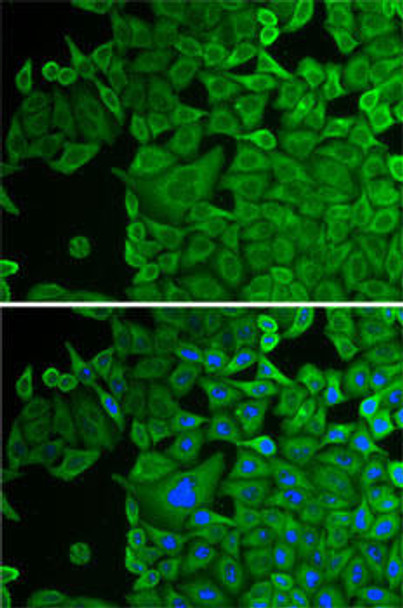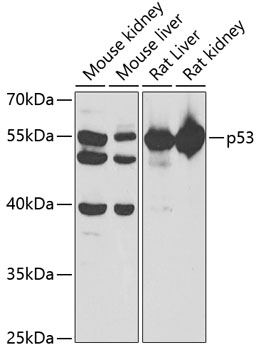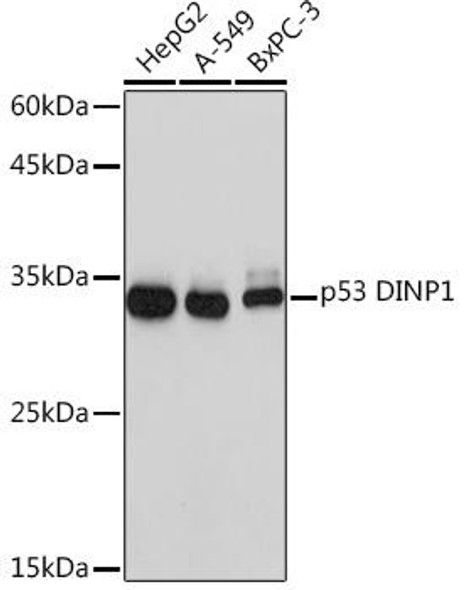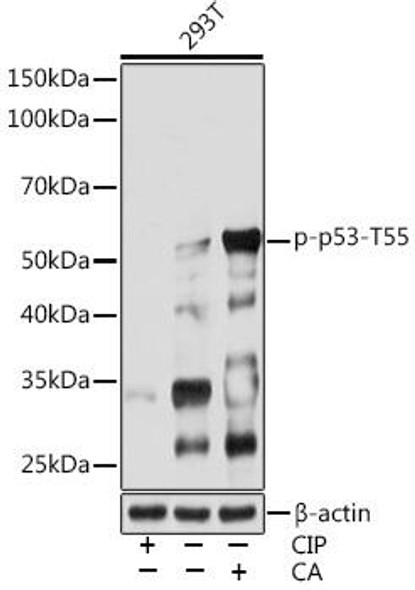Cell Biology Antibodies 16
Anti-p53 Antibody (CAB5804)
- SKU:
- CAB5804
- Product Type:
- Antibody
- Reactivity:
- Human
- Reactivity:
- Mouse
- Reactivity:
- Rat
- Host Species:
- Rabbit
- Isotype:
- IgG
- Antibody Type:
- Polyclonal Antibody
- Research Area:
- Cell Biology
Description
| Antibody Name: | Anti-p53 Antibody |
| Antibody SKU: | CAB5804 |
| Antibody Size: | 20uL, 50uL, 100uL |
| Application: | WB IF |
| Reactivity: | Human, Mouse, Rat |
| Host Species: | Rabbit |
| Immunogen: | Recombinant fusion protein containing a sequence corresponding to amino acids 95-390 of mouse p53 (NP_035770.2). |
| Application: | WB IF |
| Recommended Dilution: | WB 1:500 - 1:2000 IF 1:10 - 1:100 |
| Reactivity: | Human, Mouse, Rat |
| Positive Samples: | Mouse kidney, Mouse liver, Rat Liver, Rat kidney |
| Immunogen: | Recombinant fusion protein containing a sequence corresponding to amino acids 95-390 of mouse p53 (NP_035770.2). |
| Purification Method: | Affinity purification |
| Storage Buffer: | Store at -20'C. Avoid freeze / thaw cycles. Buffer: PBS with 0.02% sodium azide, 50% glycerol, pH7.3. |
| Isotype: | IgG |
| Sequence: | PSQK TYQG NYGF HLGF LQSG TAKS VMCT YSPP LNKL FCQL AKTC PVQL WVSA TPPA GSRV RAMA IYKK SQHM TEVV RRCP HHER CSDG DGLA PPQH LIRV EGNL YPEY LEDR QTFR HSVV VPYE PPEA GSEY TTIH YKYM CNSS CMGG MNRR PILT IITL EDSS GNLL GRDS FEVR VCAC PGRD RRTE EENF RKKE VLCP ELPP GSAK RALP TCTS ASPP QKKK PLDG EYFT LKIR GRKR FEMF RELN EALE LKDA HATE ESGD SRAH SSYL KTKK GQST SRHK KTMV KKVG PDSD |
| Gene ID: | 22059 |
| Uniprot: | |
| Cellular Location: | Cytoplasm, Endoplasmic reticulum, Mitochondrion matrix, Nucleus, PML body |
| Calculated MW: | 43kDa |
| Observed MW: | 55kDa |
| Synonyms: | TP53, BCC7, LFS1, P53, TRP53, Trp53, bbl, bfy, bhy, p44, p53, Tp53 |
| Background: | This gene encodes a tumor suppressor protein containing transcriptional activation, DNA binding, and oligomerization domains. The encoded protein responds to diverse cellular stresses to regulate expression of target genes, thereby inducing cell cycle arrest, apoptosis, senescence, DNA repair, or changes in metabolism. Mutations in this gene are associated with a variety of human cancers, including hereditary cancers such as Li-Fraumeni syndrome. Alternative splicing of this gene and the use of alternate promoters result in multiple transcript variants and isoforms. Additional isoforms have also been shown to result from the use of alternate translation initiation codons from identical transcript variants (PMIDs: 12032546, 20937277). |








